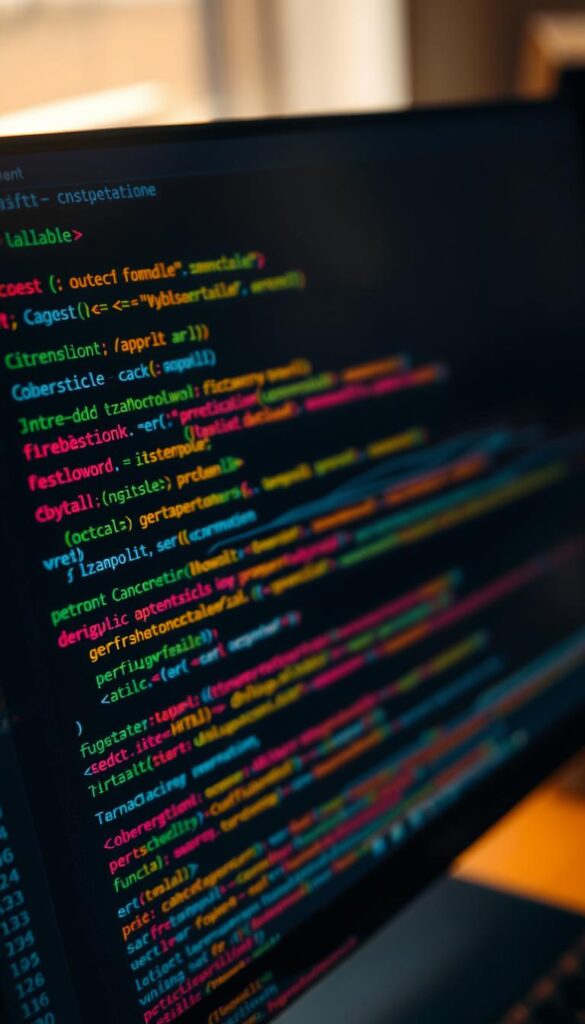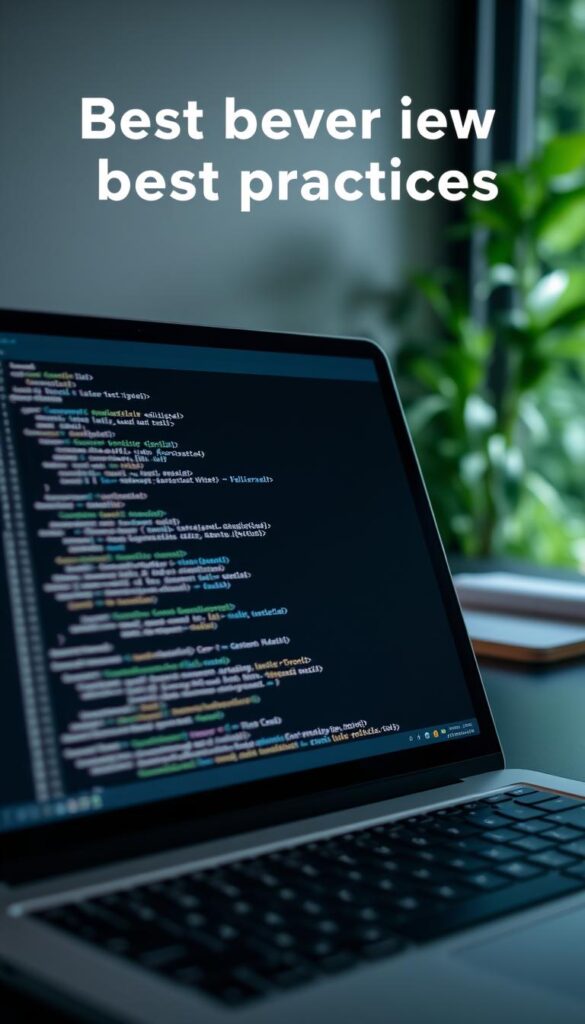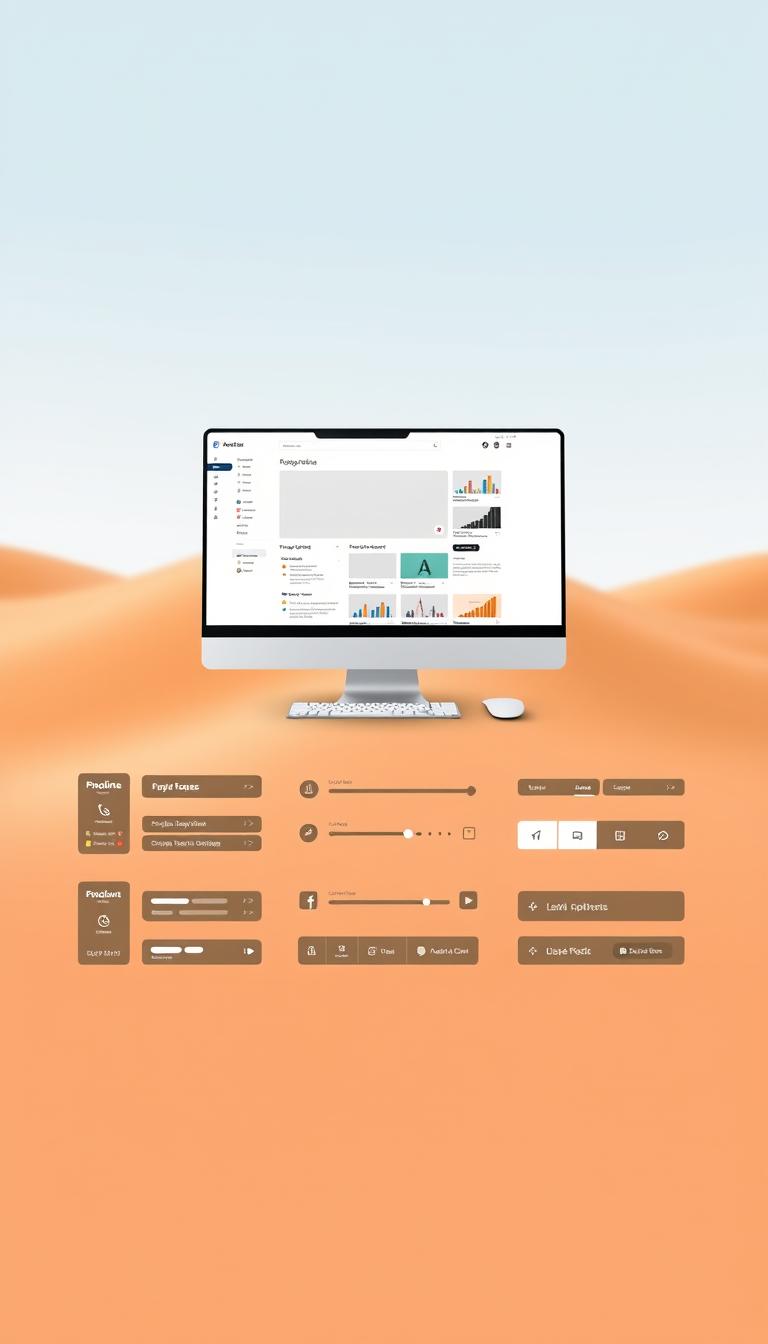
Learning to code might seem tough if you have no experience. But, anyone can start learning coding from scratch by setting achievable goals and using free resources.
We think that embracing coding is a journey that opens doors to new opportunities. By using online communities and free coding resources, we can start building our coding skills today.
Starting with the basics is key. We will explore the fundamentals of coding and its relevance in today’s world. This makes it easier for beginners to get started.
Key Takeaways
- Setting realistic goals is crucial for learning to code.
- Utilizing free coding resources can accelerate your learning process.
- Engaging with online communities supports continuous growth.
- Understanding the basics of coding is essential for beginners.
- Coding skills are highly relevant in today’s digital world.
What is Programming and Why Do We Need It?
The world is becoming more digital, and programming is at the heart of this transformation. As our reliance on technology grows, so does the importance of understanding the basics of computer programming and coding languages.
Understanding the Basics
Computer programming is the process of designing, writing, testing, and maintaining the source code of computer programs. It involves using programming languages to give instructions to computers, enabling them to perform specific tasks. Programming languages like Python, JavaScript, and Java are the tools used to write these instructions.
To understand programming, one must first grasp the concept of algorithms. Algorithms are step-by-step procedures for solving problems or achieving a particular goal. Algorithms are the backbone of programming, as they provide the logic and structure necessary for writing effective code.
Importance in Today’s World
In today’s digital landscape, programming plays a vital role in web development, mobile app development, data analysis, artificial intelligence, and more. The ability to code is no longer limited to the tech industry; it’s becoming increasingly valuable across various sectors.
| Industry | Application of Programming |
|---|---|
| Web Development | Building dynamic websites and web applications |
| Data Analysis | Analyzing and interpreting complex data sets |
| Artificial Intelligence | Developing intelligent systems that can learn and adapt |
As we continue to navigate the digital age, the demand for skilled programmers will only continue to grow. Understanding the basics of programming and its applications is crucial for anyone looking to make an impact in today’s technology-driven world.
Popular Programming Languages to Start With
The world of programming is vast, with many languages to learn. Some are better for beginners. Choosing the right language is key to your learning and career.
Python: Easiest for Beginners
Python is great for new coders because it’s simple. It’s versatile and widely used in web development, data analysis, and more.
- Easy to learn and understand
- Extensive libraries and frameworks
- Large community support
JavaScript: The Language of the Web
JavaScript is key for web development. It’s used for both backend and frontend. It’s essential for web development, making web apps interactive.
- Ubiquitous in web development
- Used by most websites for client-side scripting
- Extensive frameworks like React and Angular
Java: A Versatile Choice
Java is known for running on any platform thanks to the Java Virtual Machine (JVM). It’s great for big projects, like Android apps and enterprise software.
- Platform independent
- Robust security features
- Large community and resources
In conclusion, Python, JavaScript, and Java are top choices for beginners. Each has its strengths for different projects. Knowing these languages helps new programmers decide their path.
Setting Up Your Programming Environment
Creating a good programming environment is key for coding. You need the right tools and software to make coding easier and faster.

Choosing the Right Text Editor
A text editor is where you’ll spend most of your coding time. It’s important to pick one that suits you. Popular choices include Visual Studio Code, Sublime Text, and Atom.
When choosing a text editor, think about ease of use, customization, and plugins. These can make your coding better.
Key Features to Look for in a Text Editor:
- Syntax highlighting to make your code more readable
- Auto-completion to speed up your coding process
- Debugging tools to help identify and fix errors
- Version control integration, such as Git, to manage your code changes
Installing Necessary Software
Depending on your programming language, you might need extra software. For example, Python needs a Python interpreter. JavaScript might require Node.js for server-side coding.
Steps to Install Necessary Software:
- Identify the software required for your chosen programming language
- Download the software from the official website to ensure you’re getting a legitimate and safe copy
- Follow the installation instructions provided with the software
- Verify that the software is correctly installed by running a simple test program
Learning Resources for New Programmers
The world of programming is vast and exciting. The right tools can make a big difference for beginners. It’s important to find resources that help develop programming skills.
Online Courses and Tutorials
Many free online platforms offer interactive coding lessons for beginners. You can start learning coding without spending money. Some popular options include:
- Coursera: Offers a wide range of courses on coding languages and software development.
- Codecademy: Provides interactive coding lessons in various programming languages.
- edX: Features courses and tutorials from leading institutions worldwide.
Books That Make Learning Easier
Books are also a valuable resource for learning programming. They offer detailed explanations and examples. Some recommended books include:
| Book Title | Focus Area | Level |
|---|---|---|
| “Python Crash Course” | Python Programming | Beginner |
| “JavaScript: The Definitive Guide” | JavaScript | Intermediate |
| “Head First Java” | Java Programming | Beginner |
Community Forums and Support
Joining community forums can provide valuable support and guidance. Some popular communities include:
- Stack Overflow: A Q&A platform for programmers.
- Reddit: Subreddits like r/learnprogramming and r/webdev offer a wealth of information and support.
- GitHub: A platform for version control and collaboration, where you can find open-source projects and community support.

⭐️ Tap the exclusive deal link https://temu.to/k/uot8tcxvwum to score top-quality items at ultra-low prices. 🛍️ These unbeatable deals are only available here. Shop now and save big! ⭐️ Directly get exclusive deal in Temu app here: https://app.temu.com/m/mhb5rstagbx
Another surprise for you! Click https://temu.to/k/uag0bn0o0wd to earn with me together🤝!
By using these resources, new programmers can improve their programming skills. They can become proficient in their chosen coding languages. Whether through online courses, books, or community forums, the key is to stay engaged and keep practicing.
Writing Your First Code
Starting your programming journey means writing your first code. It’s key to know the basics of a programming language.
Understanding Syntax and Structure
Every programming language has its own rules for writing code. Syntax is about following these rules. It includes how to write commands, use punctuation, and declare variables. Knowing the syntax is vital because it tells the computer how to read our code.
Variables are essential in programming. They let us store, use, and change data. When we declare a variable, we give it a name. This name lets us use the value in our program. For instance, we can declare a variable named age and set it to 25. Then, we can use age in our code to mean 25.

Creating a Simple Program
To make a simple program, first decide what it should do. Let’s say we want a program that greets the user. We can do this by using a variable for the user’s name and then printing a greeting.
- Declare a variable to store the user’s name.
- Prompt the user to enter their name.
- Store the input in the variable.
- Print out a greeting message that includes the name stored in the variable.
By following these steps, we can make a simple program that talks to the user. This example shows how powerful programming can be and sets the stage for more complex projects.
As we keep learning about coding, we’ll tackle more advanced topics. We’ll build on what we’ve learned about syntax, structure, and variables.
Debugging: The Art of Problem Solving
In programming, debugging is crucial for making top-notch software. It needs both technical know-how and problem-solving skills. As we build complex apps, bugs pop up, making debugging essential.
Good debugging means finding and fixing problems in a methodical way. It’s not just about fixing code; it’s about finding the real cause of problems. This way, we fix issues now and make our coding better to avoid future problems.
Common Errors and How to Fix Them
Programmers face many common errors, like syntax mistakes or logical flaws. Syntax errors, like missing semicolons, are easy to spot and fix. But logical errors need a deeper look into the code’s purpose and how it works.
To solve these problems, we use several methods, such as:
- Checking code line by line for syntax errors or typos.
- Using print statements or debuggers to see how the code runs.
- Testing parts of the code to find where logical errors come from.
Using these methods helps us find and fix common errors, making our coding better.

Tools for Efficient Debugging
The right tools make debugging easier. Modern IDEs have tools like breakpoints and watch variables. These help us see how our code works in real-time, making it easier to find and fix problems.
Some top debugging tools are:
- Visual Studio Debugger: Great for .NET and C++ apps.
- Chrome DevTools: Perfect for web apps, with tools for JavaScript and network checks.
- GDB: A strong command-line debugger for C, C++, and more.
With these tools, we can debug faster, saving time and reducing stress.
Version Control Systems Explained
In programming, version control systems are key for developers everywhere. They help manage code changes, team work, and keep track of all updates.
Version control does more than just track changes. It acts as a safety net for your projects. Developers can try new things without harming their codebase.
What is Git?
Git is a top version control tool, used by over 95% of developers. It’s known for its flexibility and handling big projects well. Git lets developers work on different parts of a project at once.
“Git is a free and open source distributed version control system designed to handle everything from small to very large projects with speed and efficiency.”
Benefits of Version Control
Using version control systems like Git has many advantages. They improve teamwork, manage code better, and track changes. Version control also makes it simple to go back to older code if needed.
| Feature | Benefit |
|---|---|
| Branching | Allows for parallel development and reduces conflicts |
| Version History | Provides a record of all changes, enabling easy rollback if needed |
| Collaboration | Facilitates teamwork by allowing multiple developers to work on the same project |
As we delve deeper into programming, knowing and using version control systems will grow more crucial. Whether on a personal project or open-source, version control is a must-have tool.

Understanding Algorithms and Data Structures
As we dive deeper into programming, understanding algorithms and data structures is key. These concepts help developers make software that works well and can grow. They also make it easier to keep the software running smoothly.
The Role of Algorithms in Programming
Algorithms are step-by-step guides for solving problems or reaching a goal. In programming, they are crucial for tasks like sorting data and searching for information. Efficient algorithms can make these tasks faster and use less resources.
For example, sorting a list of numbers can be done in many ways. Bubble Sort, Quick Sort, and Merge Sort are some of these methods. Each has its own strengths and weaknesses, depending on the task’s needs.
- Bubble Sort is simple but less efficient for large datasets.
- Quick Sort is generally faster but can have poor performance in certain scenarios.
- Merge Sort is reliable and efficient, making it suitable for large datasets.
Basic Data Structures to Know
Data structures are ways to organize and store data for easy access and changes. Common ones include arrays, linked lists, stacks, queues, trees, and graphs. Knowing these is essential for writing good code.
Arrays are great for storing data collections, while linked lists are flexible for adding and removing elements. Stacks and queues help manage data in specific orders.
| Data Structure | Key Characteristics | Common Use Cases |
|---|---|---|
| Arrays | Fixed size, contiguous memory allocation | Storing collections of data, matrix operations |
| Linked Lists | Dynamic size, non-contiguous memory allocation | Frequent insertions and deletions, dynamic memory allocation |
| Stacks | LIFO order, elements are added and removed from the top | Parsing, evaluating postfix expressions, backtracking algorithms |
Knowing algorithms and data structures is more than just knowing what they are. It’s about using them well in real-world programming. As we keep learning programming concepts, the value of these basics will grow.

Building Projects to Enhance Skills
Improving our programming skills is easier with personal and open-source projects. These projects let us use our knowledge to solve real problems. This boosts our coding skills and deepens our understanding of web development.
Starting Small: Personal Projects
Begin with personal projects that catch your interest. This could be a simple calculator or a personal website. These projects teach us by doing and let us try out new coding methods.
For example, if you’re into web development, start with a basic website. Use HTML, CSS, and JavaScript. As you get better, add more features and technologies, like backend development with Node.js or Python.
| Project Type | Description | Skills Learned |
|---|---|---|
| Simple Calculator | A basic application for performing arithmetic operations. | JavaScript, UI/UX |
| Personal Website | A website showcasing personal information and skills. | HTML, CSS, JavaScript |
| To-Do List App | An application for managing daily tasks. | React, State Management |
Contributing to Open Source
After gaining experience with personal projects, try open-source projects. They let you work with other developers, learn from them, and help the coding community.
To start with open-source, look at GitHub or GitLab. Find projects that match your interests and skills. Start by fixing issues or adding new features.

Building personal projects and working on open-source projects greatly improves our programming skills. These activities not only sharpen our technical skills but also prepare us for web development challenges in the real world.
Best Practices for Writing Clean Code
As programmers, we aim to write code that works well and is easy to keep up with. Clean code is key for easy reading and upkeep. We’ll look at the best ways to do this in this section.
Clean code is vital for smooth software development and teamwork. It helps developers quickly grasp each other’s work. This cuts down on debugging and upkeep time.
To write clean code, we focus on making it easy to read and maintain. Good code is like a clear book; it’s straightforward and simple. Keeping the code efficient over time is also important.
Code Readability and Maintenance
Several things affect how easy code is to read, like naming, structure, and comments. Using clear variable names and sticking to a coding style is key.
Commenting and Documentation
Comments and documentation are crucial for grasping the code’s purpose and how it works. Comments should be brief and explain the “why” behind the code, not just the “what.”
Good documentation gives a wider view of the codebase. It covers its structure, use, and upkeep tips.
| Best Practice | Description | Benefit |
|---|---|---|
| Meaningful Naming | Use descriptive names for variables and functions. | Improves code readability. |
| Consistent Coding Style | Follow a consistent coding style throughout the project. | Reduces confusion and improves maintainability. |
| Clear Commenting | Write comments that explain the purpose of the code. | Helps other developers understand the code. |

By sticking to these best practices, developers can boost their programming skills. They help make software development projects more efficient.
Networking with Other Programmers
As we keep coding, it’s key to connect with other programmers. Networking opens doors to new chances, teamwork, and a better grasp of coding.
“The way to get started is to quit talking and begin doing,” Donald Knuth said. This shows the value of hands-on experience and joining the community. By talking to other programmers, we can learn from them, share our skills, and grow together.
Attending Meetups and Workshops
Going to meetups and workshops is a smart way to network. These events let you meet people who think like you, learn about new coding stuff, and show off your work.
- Meetups help you meet local programmers and hear about their journeys.
- Workshops give you a chance to try out new coding tools and tech.
For example, a web development workshop can keep you in the loop with web trends. This includes updates on JavaScript and making websites that work well on all devices.

Joining Online Communities
Online communities are also great for networking. Sites like GitHub, Stack Overflow, and r/learnprogramming on Reddit are perfect for asking questions, sharing tips, and working on projects together.
Online communities offer many benefits:
- They give you access to a huge amount of knowledge and resources.
- They let you work on projects with others and get feedback.
- They help you connect with programmers all over the world.
“The best way to learn is by doing, and the best way to learn with others is by sharing your doing with others.” –
By being active in these communities, you can improve your coding, keep up with the latest in the field, and make real connections in the programming world.
The Future of Programming
As we move forward in software development, it’s key to keep up with new trends and tech. Programming is always changing, with new languages and tools coming out. These changes help us tackle the complex digital world we live in.
Emerging Trends
Technologies like AI, machine learning, and blockchain are changing software development. These new tools need developers to learn and use specific programming languages. These languages are made to work well with these new technologies.
Staying Ahead
To stay current, we must keep learning and growing. We need to know about the latest in software development. This means joining online forums and talking with other developers to share ideas and tips.
By always learning and adapting, we can keep innovating. This drives progress and shapes the future of technology.






